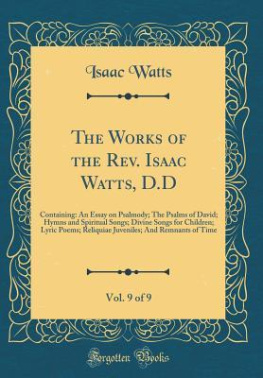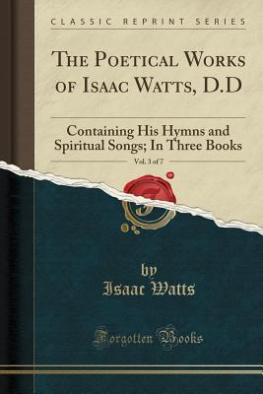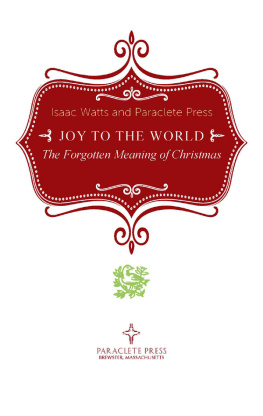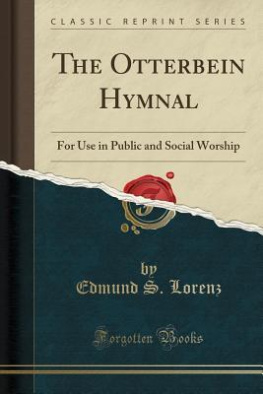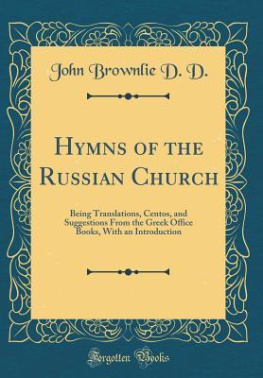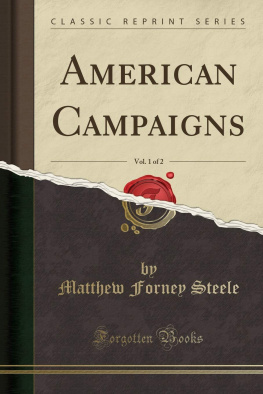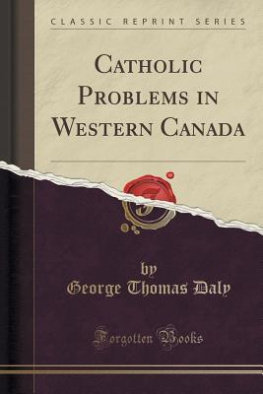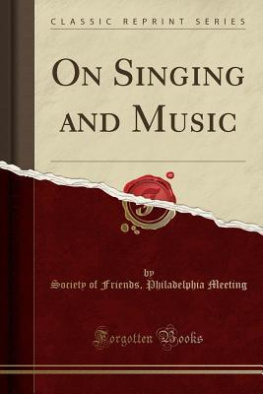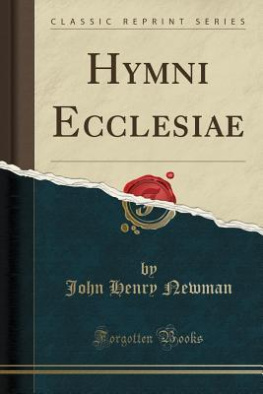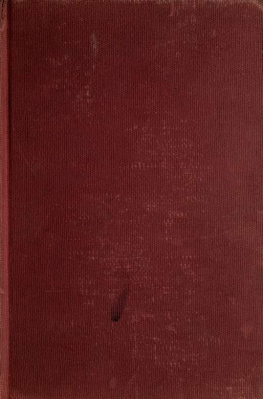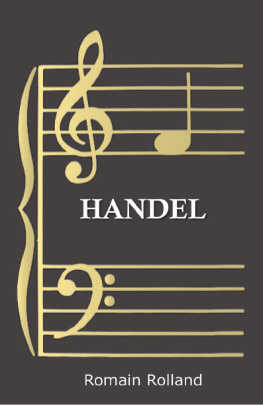The Project Gutenberg EBook of The Psalms of David, by Isaac Watts
This eBook is for the use of anyone anywhere at no cost and withalmost no restrictions whatsoever. You may copy it, give it away orre-use it under the terms of the Project Gutenberg License includedwith this eBook or online at www.gutenberg.org
Title: The Psalms of David Imitated in the Language of The New Testament And Applied to The Christian State and Worship
Author: Isaac Watts
Release Date: August 12, 2004 [EBook #13166]
Language: English
*** START OF THIS PROJECT GUTENBERG EBOOK THE PSALMS OF DAVID ***
Produced by Lewis Jones.
The Psalms of David
Imitated in the Language of
The New Testament
And Applied to
The Christian State and Worship
By I. Watts D.D.
Luke xxiv. 44All things must be fulfilled which were written in the Psalmsconcerning me.
HEB. xi. 32, 40.David, Samuel, and the prophets that they without us shouldnot be made perfect.
Transcriber's Note.
There are significant differences in the numerous reprints of
Isaac Watts' "Psalms." The first generation of this Project
Gutenberg file was from an 1818 printing by C. Corrall of
38 Charing Cross, London.
The Index and the Table of First Lines have been omitted forthe following reasons:1. They refer to page numbers that are here expunged; and2. In this electronic version key words, etc., can be easilylocated via searches.
Separate numbers have been added to Psalms that have more thanone part or version, for example: Psalm 51:1; Psalm 51:2; etc.
The Life of Isaac Watts, D.D.
by
Dr. Johnson.
From his lives of the most eminent English Poets.
The Poems of Dr. Watts were by my recommendation inserted in thelate Collection; the readers of which are to impute to me whateverpleasure or weariness they may find in the perusal of Blackmore,Watts, Pomfret, and Yealden.
ISAAC WATTS was born July 17, 1674, at Southampton, where hisfather of the same name, kept a boarding-school for young gentlemen,though common report makes him a shoe-maker. He appears, from thenarrative of Dr. Gibbons, to have been neither indigent norilliterate.
Isaac, the eldest of nine children, was given to books from hisinfancy; and began, we are told, to learn Latin when he was fouryears old, I suppose at home. He was afterwards taught Latin,Greek, and Hebrew, by Mr. Pinhorne, a clergyman, master of thefreeschool at Southampton, to whom the gratitude of his scholarafterwards inscribed a Latin ode.
His proficiency at school was so conspicuous, that a subscriptionwas proposed for his support at the University; but he declaredhis resolution to take his lot with the Dissenters. Such he was,as every Christian Church would rejoice to have adopted.
He therefore repaired in 1690 to an academy taught by Mr. Rowe,where he had for his companions and fellow-students Mr. Hughesthe poet, and Dr. Horte, afterwards Archbishop of Tuam. Some Latinessays, supposed to have been written as exercises at this academy,shew a degree of knowledge, both philosophical and theological,such as very few attain by a much longer course of study.
He was, as he hints in his Miscellanies, a maker of verses fromfifteen to fifty, and in his youth he appears to have paid attentionto Latin poetry. His verses to his brother, in the glyconicmeasure, written when he was seventeen, are remarkably easy andelegant. Some of his other odes are deformed by the Pindaric follythen prevailing, and are written with such neglect of all metricalrules as is without example among the ancients; but his diction,though perhaps not always exactly pure, has such copiousness andsplendour, as shews that he was but at a very little distancefrom excellence.
His method of study was to impress the contents of his books uponhis memory by abridging them, and by interleaving them, to amplifyone system with supplements from another.
With the congregation of his tutor Mr. Rowe, who were, I believe,independents, he communicated in his nineteenth year.
At the age of twenty he left the academy, and spent two years instudy and devotion at the house of his father, who treated himwith great tenderness; and had the happiness, indulged to fewparents, of living to see his son eminent for literature andvenerable for piety.
He was then entertained by Sir John Hartopp five years, as domestictutor to his son: and in that time particularly devoted himselfto the Study of the Holy Scriptures; and being chosen assistantto Dr. Chauncey, preached the first time on the birth-day thatcompleted his twenty-fourth year; probably considering that asthe day of a second nativity, by which he entered on a new periodof existence.
In about three years he succeeded Dr. Chauncey; but soon after hisentrance on his charge, he was seized by a dangerous illness, whichsunk him to such weakness, that the congregation thought an assistantnecessary, and appointed Mr. Price. His health then returnedgradually, and he performed his duty, till (1712) he was seizedby a fever of such violence and continuance, that from the feeblenesswhich it brought upon him, he never perfectly recovered.
This calamitous state made the compassion of his friends necessary,and drew upon him the attention of Sir Thomas Abney, who receivedhim into his house; where with a constancy of friendship anduniformity of conduct not often to be found, he was treated forthirty-six years with all the kindness that friendship couldprompt, and all the attention that respect could dictate. SirThomas died about eight years afterwards; but he continued withthe lady and her daughters to the end of his life. The lady diedabout a year after him.
A coalition like this, a state in which the notions of patronageAnd dependence were overpowered by the perception of reciprocalbenefits, deserves a particular memorial; and I will not withholdfrom the reader Dr. Gibbons's representation, to which regard isto be paid as to the narrative of one who writes what he knows,and what is known likewise to multitudes besides.
"Our next observation shall be made upon that remarkably kindprovidence which brought the doctor into Sir Thomas Abney's family,and continued him there till his death, a period of no less thanthirty-six years. In the midst of his sacred labours for the gloryof God, and good of his generation he is seized with a most violentand threatening fever, which leaves him oppressed with greatweakness, and puts a stop at least to his public services for fouryears. In this distressing season, doubly so to his active andpious spirit, he is invited to Sir Thomas Abney's family, nor everremoves from it till he had finished his days. Here he enjoyed theuninterrupted demonstrations of the truest friendship. Here, withoutany care of his own, he had everything which could contribute tothe enjoyment of life, and favour the unwearied pursuits of hisstudies. Here he dwelt in a family, which, for piety, order,harmony, and every virtue, was an house of God. Here he had theprivilege of a country recess, the fragrant bower, the spreadinglawn, the flowery garden, and other advantages to sooth his mindand aid his restoration to health; to yield him, whenever he chosethem, most grateful intervals from his laborious studies, andenable him to return to them with redoubled vigour and delight.Had it not been for this most happy event, he might as to outwardview, have feebly, it may be painfully, dragged on through manymore years of languor and inability for public service, and evenfor profitable study, or perhaps might have sunk into his graveunder the overwhelming load of infirmities, in the midst of hisdays; and thus the church and world would have been deprived ofthose many excellent sermons and works which he drew up andpublished during his long residence in this family. In a few yearsafter his coming hither, Sir Thomas Abney dies; but his amiableconsort survives, who shows the Doctor the same respect andfriendship as before, and most happily for him and great numbersbesides; for, as her riches were great her generosity and munificencewere in full proportion; her thread of life was drawn out to agreat age, even beyond that of the Doctor's; and thus this excellentman, through her kindness, and that of her daughter, the presentMrs. Elizabeth Abney, who in a like degree esteemed and honouredhim, enjoyed all the benefits and felicities he experienced athis first entrance into this family, till his days were numberedand finished, and, like a shock of corn in its season, he ascendedinto the regions of perfect and immortal life and joy."
Next page
